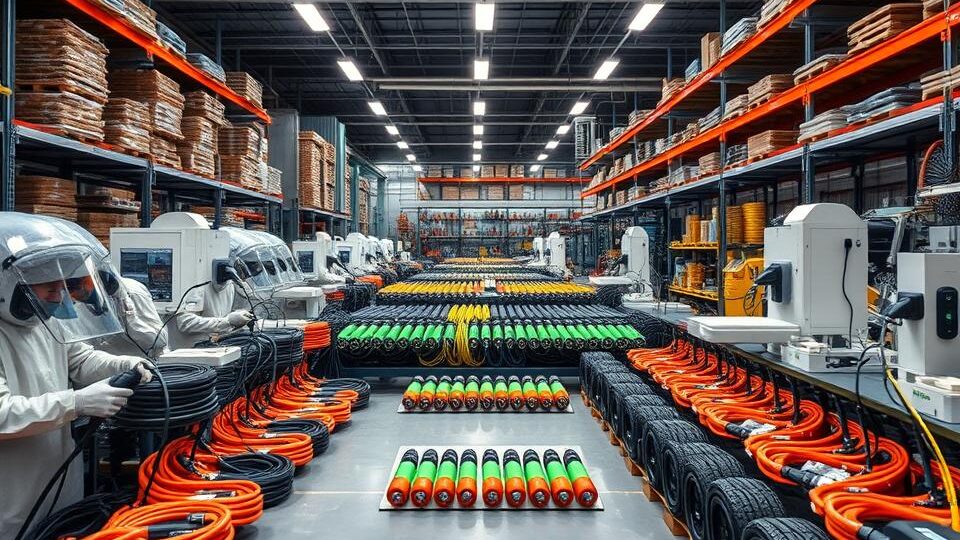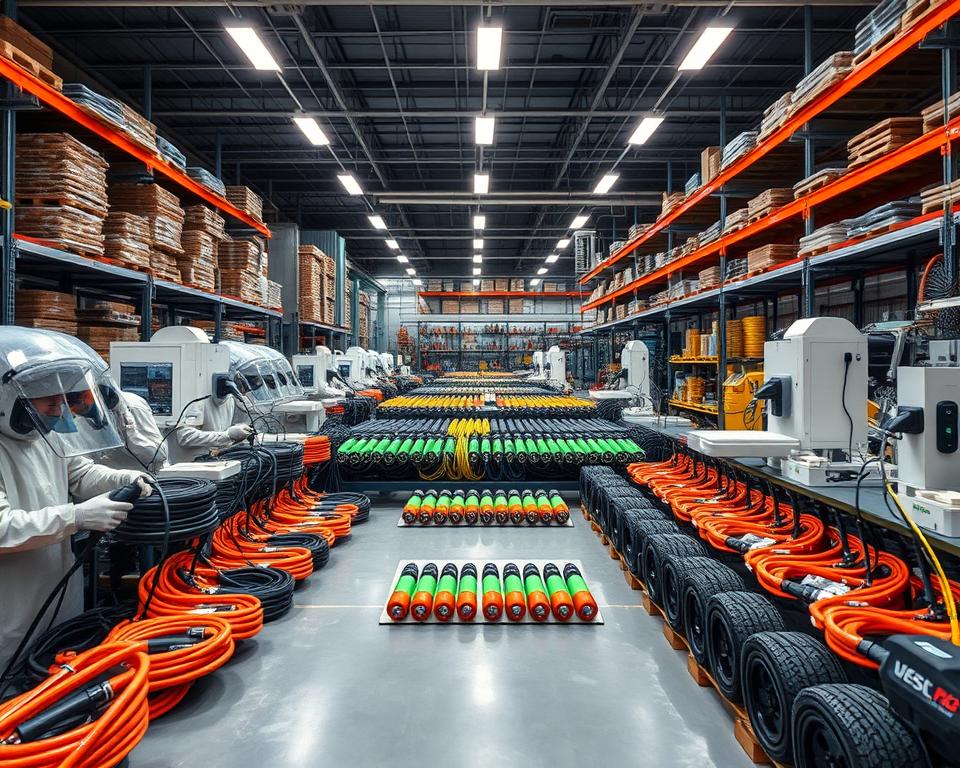
EV Charging Cable Manufacturers vs Aftermarket Providers
Premier EV Charging Cable Manufacturers for Your Electric Vehicle
The electric vehicle industry is on the rise, with the demand for trustworthy and high-performance charging solutions increasing sharply. Today, top brands have been at the cutting edge of this change, providing high-quality charging infrastructure. Southwire, for instance, has been a significant player since 2014, garnering 1000+ five-star reviews and a 75-year legacy in electrical construction.
The surge in electric vehicle adoption necessitates the need for robust, quick, and reliable Charger Manufacturers in China. Top manufacturers are developing to meet these evolving needs, offering solutions that enhance the overall charging experience.
Grasping the distinctions between various charging solutions is crucial for making informed decisions. High-grade charging infrastructure directly influences vehicle performance and user experience.
Critical Findings
- Leading brands provide premium cables that boost durability and security.
- The demand for efficient charging infrastructure is on the rise with the growth of the electric vehicle market.
- Industry leaders develop cutting-edge products for EV drivers.
- High-grade cables improve energy transfer and driving range.
- Opting for top-tier cables yields future savings.

The Growing Importance of Quality EV Charging Cables
As more drivers choose EVs, the value of high-quality EV charging cables is undeniable. The performance, safety, and reliability of electric vehicle charging systems rest on the quality of the charging cables used.
How EV Charging Tech Has Advanced
Charging tech for EVs has evolved rapidly, with a priority on speedy charge times and enhanced protections. Today’s EV charging cables are designed to meet these evolving needs, featuring superior materials and construction techniques to minimize energy waste and maximize transfer rates.
Quality’s Impact on EV Charging
High-grade cables ensure reliable, safe charging. Robustness, such as weather resistance and flexibility in extreme temperatures, maintain performance in harsh conditions. Moreover, regulatory compliance and adherence to industry guidelines are essential in ensuring that cables meet rigorous safety requirements.
| Key Features | Benefits |
|---|---|
| High-grade build quality | Reduced energy waste |
| Enhanced durability features | Weather resistance, flexibility in extreme temperatures |
| Regulatory compliance | Rigorous safety requirements met |
| Maintainability | Long-term value proposition, reduced waste |
Products from Aichie Tech Electronics pass The Cable Lab’s stringent tests. With repairable Portable EV Charger Manufacturer, users can save hundreds over a decade by choosing repairs over replacements, reducing waste and protecting the planet.
Premier Chinese EV Cable Suppliers
A surge of cable makers in China supports the EV boom. They play a key role in global EV infrastructure, offering premium charging cables designed for different applications.
Wottz: Industry Leaders Since 2014
Wottz has established itself as a prominent player in the EV charging cable market since 2014. They offer a range of cables that meet the specific requirements of EV charging systems, including Mode 1, 2, 3, and fast-charging Mode 4 DC Charging.
Aichie Tech Electronics: 75+ Years of Electrical Expertise
Aichie Tech Electronics leverages 75 years of electrical expertise in its EV cables. Their products are built for residential and commercial applications.
Additional Key Cable Suppliers
Specialists in Type 1/Type 2 connectors and environmental-resistant cables are emerging players. These include Type 1 & 2 connector experts, as well as brands innovating in cable durability and adaptability.
Types of EV Charging Cables Explained
As electric vehicles become increasingly popular, understanding the various types of EV Charging Cable Manufacturers is crucial for optimal charging experiences. Knowing cable types ensures you pick the right charger. The diversity in EV charging infrastructure necessitates a closer look at the different cable types available.
Type1 vs. Type2 Charging Cables
SAE J1772 (Type 1) and Mennekes (Type 2) are the main global standards. Type 1, also known as SAE J1772, is North American standard, while Type 2, or Mennekes, is the European norm. The choice between these cables depends on the vehicle’s connector type and the charging station’s compatibility. Type 2 cables often support higher charging capacities, making them ideal for speed.
Level2 and DC Fast Charging Solutions
Level2 charging cables offer faster charging than Level1, using 240V AC power to deliver up to 19.2 kW of power. DC Fast Charging cables, on the other hand, enable quick top-ups by on-site AC→DC conversion, delivering rapid fill-ups. These cables are key for highway charging, enabling drivers to recharge quickly.
Portable and Tethered Cable Options
Portable EV charging cables, such as “Granny chargers,” offer flexibility by allowing owners to charge their vehicles from standard household outlets. Tethered cables are attached permanently, providing a convenient but less flexible charging solution. The choice depends on the owner’s charging needs and preferences.
Cable length, power rating, and connector type matter most. For instance, portable charging cables range from simple L1 cords to full L2 kits. Vehicle-to-load (V2L) cables represent an emerging category, enabling EVs to power external devices.
- Flexible granny chargers and L2 units suit various needs.
- Tethered cables are permanently attached to charging stations, limiting flexibility but eliminating the need for personal cables.
- Cable length is a critical consideration, with options ranging from 5-meter standard cables to 50-meter extended cables.
Attributes of Premium EV Cables
Premium cables stand out for durability, safety, and performance. These features are vital to safe, efficient charging.
Robustness and Weatherproofing
Cables must withstand rain, sun, and cold. Manufacturers like Wottz and Southwire craft their cables from recyclable materials that adhere to ROHS compliance, ensuring they withstand various environmental conditions. Their serviceable design facilitates easy maintenance and promotes recycling.
Flexibility and Ease of Use
Flexibility and ease of use are also critical factors. High-quality EV charging cables are designed to be flexible, making them easier to handle and maneuver. This flexibility does not compromise their durability, as they are built to withstand regular use.
Safety Certifications and Compliance Standards
Approved safety marks ensure reliable performance. They ensure their products meet or exceed standards such as IEC62196 for connectors and UL2594 in North America. Rigorous third-party testing evaluates electrical safety, mechanical durability, and environmental resistance.
| Certification | Description | Region |
|---|---|---|
| IEC62196 | Connector safety standards | International |
| UL2594 | Standard for electric vehicle supply equipment | North America |
| ROHS | Restriction of hazardous substances | International |
Emphasizing these attributes yields cables that are safe, durable, and user-friendly.
Innovative Technologies from Leading EV Charging Cable Manufacturers
The latest developments in EV charging cable technology are revolutionizing the way we charge our vehicles, with a focus on speed, reliable data transfer, and eco-friendly materials.
Liquid-Cooled Charging Cables for Ultra-Fast Charging
Liquid-cooled charging cables are emerging as a key technology for ultra-fast charging, enabling electric vehicles to charge at significantly higher speeds without overheating.
Advanced Connector Tech
Hyperboloid contact points improve electrical connection, ensuring reliable and efficient data transfer during the charging process.
Green Charging Cable Designs
Leading manufacturers are prioritizing sustainability in their cable designs, minimizing ecological footprint with RoHS-compliant, serviceable builds. For instance, companies like Aichie Tech Electronics and Wottz are adopting serviceable design philosophies and RoHS compliance to minimize waste and promote recycling.
The industry’s shift towards sustainability includes the use of TPU jackets, avoidance of hazardous substances, and the development of take-back programs for end-of-life disassembly and material recovery.
Choosing the Perfect EV Cable
Choosing the right EV charging cable is crucial for efficient and safe charging. To make an informed decision, consider several key factors.
Compatibility with Your Electric Vehicle Model
Verify your car’s inlet and cable plug match. Your vehicle’s onboard charger capacity sets the upper limit for AC power.
Picking the Right Cable Length
Choose a cable length that suits your charging needs. A longer cable adds reach at the cost of extra weight.
Power Rating & Charge Rate
Ensure cable amperage aligns with charger and car. Standard Level 2 home charging operates at 7.2 kW, but some vehicles support up to 19.2 kW with appropriate electrical service.
By considering these factors, you can select an EV charging cable that meets your needs and enhances your overall charging experience.
Conclusion: Investing in Quality EV Charging Infrastructure
With EV growth unabated, premium cables are essential. Choosing cables from Wottz or Aichie Tech Electronics provides long-term value and reliability. Their serviceable designs allow for component replacement, reducing waste and costs. This approach supports eco-friendly EV use.
Selecting top-grade infrastructure prepares you for next-gen charging.